
by Julie McMillian | Jan 13, 2022

Trees help to clean the air and provide a relaxing setting to reduce stress.
Photo credit: Anitra Mayhann
Do you know how vital trees really are? Trees conserve soil and water and clean the air. Research has shown that there are both mental and physical health benefits from forests. Trees provide us with oxygen through photosynthesis. Not to mention, think of the beauty they add to an area. Florida has celebrated Arbor Day for many years, since 1886 to be exact. It is the third Friday in January, whereas the National Arbor Day is the last Friday in April.
We can improve our health just by spending time outside in nature. Forests and trees can boost our immune system, reduce stress, increase our ability to sleep as well as boost energy levels while improving mood and helping us to focus. Studies in health care show a link between nature and health. Plants put off airborne chemicals called phytoncides to repel insects. The antifungal and antibacterial qualities that are put off in this process help us as we breathe them in by increasing our white blood cell count.
It is important that we remove ourselves occasionally from our office or home to explore green spaces to take a mental break. That might mean a walk in the forest, gardening, exercising, or resting and meditating to unplug from our fast-paced busy life. Many doctors encourage and incorporate this type of therapy for wellness for their patients and for children diagnosed with attention deficit disorder.
There are many ways to celebrate trees. They are a great gift for birthdays, holidays, or anniversaries. You might also consider planting a tree in honor of a family member who has passed on or to remember a beloved pet. This year, give a gift that gives back as well as be encouraged to celebrate Florida’s Arbor Day on January 21st, 2022.
Many holidays celebrate something we remember, but Arbor Day is a way to celebrate hope for the future by planting a tree to support a healthy community. I encourage you to check with your local government offices, Forrester, or Extension office to see if there are any special celebrations planned that you could join or plan your own activity to honor trees as a resource and how they impact your environment.
For more information, visit Arbor Day Foundation or Florida Urban and Community Forestry.

by Julie McMillian | Aug 27, 2021

Fingerpainting Baby Sensory Photo Source: Julie McMillian
In the early childhood years there are key experiences that are essential to development. Babies and toddlers benefit from sensory activities and it is important for overall health and well-being. When does sensory development start? The answer is before we are born. Everything we do as humans involves our senses. In a child’s first five years, sensory play supports cognitive development, language, problem solving, and social and emotional interaction as well as motor development. Research shows that sensory play is needed for children to develop more complex learning abilities as they grow.
During the first twelve months, an infant begins to build an understanding of their world. It can seem like a challenging time because they are often exploring with their mouth. There are some simple activities that are both safe and entertaining for babies at this age.

Baby Sensory Bin Photo Source: Julie McMillian
Sensory bins are hands-on interactive tools that use sight, touch, taste, hearing and smell. A sensory bin can also be used to hide and find objects which creates an opportunity to encourage language development. Fine motor skills can be developed by using the pinching, grasping, scooping, pouring, and stirring movements with a variety of tools. Sensory bins can be inexpensive and switched out easily to create strength and hand development.
Sensory Bin Ideas
- Sponges and Water
- Cooked pasta with food coloring
- Dry Cereal with or without toys
- Oobleck (2 cups cornstarch and 1 cup water)
- Gelatin
Outdoor sensory play is another great way to use multi-sensory experiences for healthy child development. Outdoor equipment at home or the park can be used. Simple experiences with grass, sand and water encourage exploration and creativity. A reserved child may come out of their shell when outdoors. Nature opportunities will provide health benefits of fresh air, exercise, and vitamin D.

Baby Sensory Outdoors Photo Source: Julie McMillian
Outdoor Sensory Ideas
- Sit in the grass
- Crawl in the sand
- Smell the flowers
- Touch the leaves
- Take a nature walk
- Have a picnic
- Read a book
As a care giver, you can focus on a certain skill that may be lacking in a child’s development or provide an array of activities that stimulate growth. When children can explore and try new experiences they can attach meaning and unlock key skills needed for their future. Sensory play is valuable and essential for learning and the activities are endless.

by Julie McMillian | Aug 24, 2021
 Julie McMillan is the Extension Agent for 4-H Youth Development and Family and Consumer Science in Gulf County. She started in March 2020 around the same time the pandemic went into full effect for many of us. It didn’t matter, though, because she couldn’t be more excited to serve the community and start her new career. Julie grew up in Gulf County in Port St. Joe. Early on, it was obvious that serving others would be a huge part of her life because it was modeled by her family. Julie joined 4-H at the age of eight and knows it contributed significantly to who she is today. She was able to learn responsibility, leadership skills, and how to make good choices while connecting with youth who would become lifelong friends. None of this enriching experience would have been possible without the Extension Agent and volunteers who gave many selfless hours to planning and preparing hands-on experiences.
Julie McMillan is the Extension Agent for 4-H Youth Development and Family and Consumer Science in Gulf County. She started in March 2020 around the same time the pandemic went into full effect for many of us. It didn’t matter, though, because she couldn’t be more excited to serve the community and start her new career. Julie grew up in Gulf County in Port St. Joe. Early on, it was obvious that serving others would be a huge part of her life because it was modeled by her family. Julie joined 4-H at the age of eight and knows it contributed significantly to who she is today. She was able to learn responsibility, leadership skills, and how to make good choices while connecting with youth who would become lifelong friends. None of this enriching experience would have been possible without the Extension Agent and volunteers who gave many selfless hours to planning and preparing hands-on experiences.
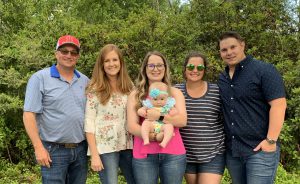
Julie’s Mom and Grandmother made sure she knew the ropes when it comes to taking care of family and anyone in need. They taught her how to make meals on a budget, grow and prepare fresh vegetables and fruit from a garden, and always give to those in need. Julie is married with two young adult daughters and a little one who was born last year. She likes spending any free time with family, friends, and their animals at their farm.
 Her background has primarily been in Education but she also worked in the health field for several years at the county health department. Julie started out teaching at a small private school and then spent many years at an Early Learning Center. Upon obtaining her Bachelor of Science Degree in 2012, she was given the opportunity to join the county school system as an elementary educator. Julie is known mostly for her love of and passion for horses. She and her husband run a small horseback riding on the beach business and have given riding lessons to people of all ages. However, this fall brings her back to school as a student. She has been accepted into the Graduate Program at the University of Florida to pursue a master’s degree in Extension Education. She is looking forward to continuing her education and expanding programs and experiences for youth and adults in her county and District.
Her background has primarily been in Education but she also worked in the health field for several years at the county health department. Julie started out teaching at a small private school and then spent many years at an Early Learning Center. Upon obtaining her Bachelor of Science Degree in 2012, she was given the opportunity to join the county school system as an elementary educator. Julie is known mostly for her love of and passion for horses. She and her husband run a small horseback riding on the beach business and have given riding lessons to people of all ages. However, this fall brings her back to school as a student. She has been accepted into the Graduate Program at the University of Florida to pursue a master’s degree in Extension Education. She is looking forward to continuing her education and expanding programs and experiences for youth and adults in her county and District.
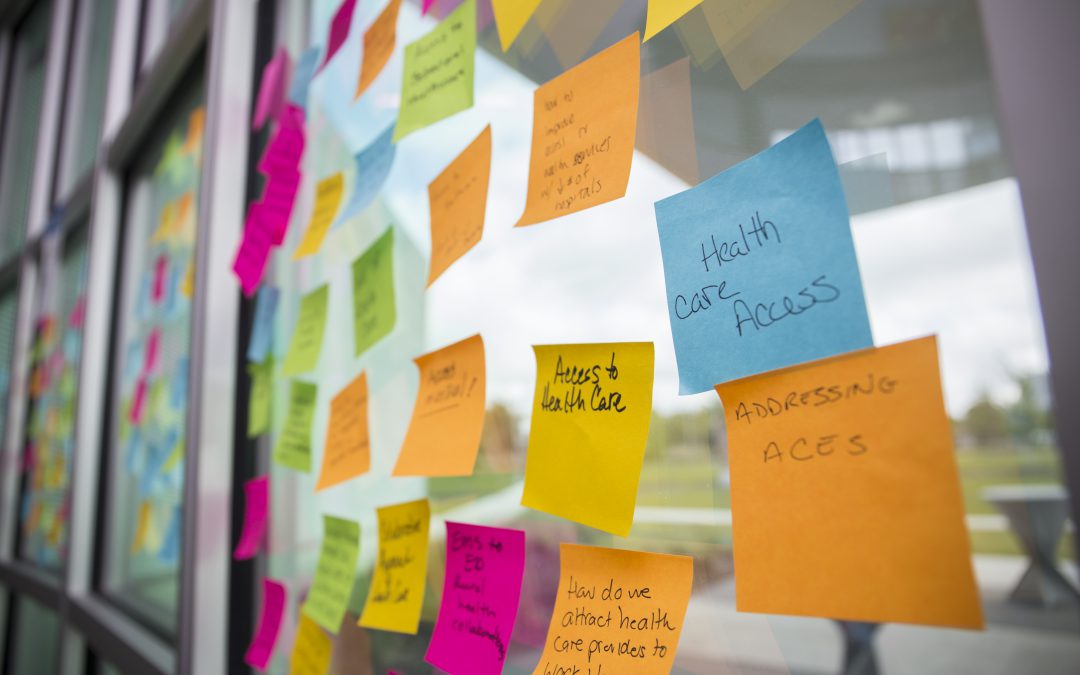
by Julie McMillian | Apr 1, 2021
Have you thought about your mental and emotional health lately? If you haven’t, it’s a great time to take some time to invest in you. Emotional wellness is the ability to handle and overcome challenges and obstacles that we often must deal with in everyday life. It doesn’t mean you will always be happy, but you are aware of and in control of your thoughts, behaviors, and actions when you have negative feelings or setbacks. Research shows that emotional health is a skill. There are many ways to improve and maintain your emotional health so you can adapt to changes as they happen.
Tips for Emotional Wellness:
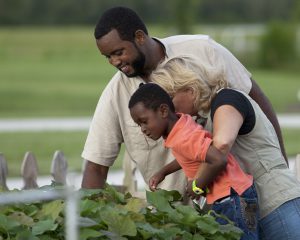
Spend time with loved ones to strengthen your relationship.
Photo credit: UF/IFAS
- Stay positive. Purposely develop a positive mindset and hold on to the positive emotions and appreciate the good times as long as you can. Focus on your outlook. Ask yourself: What gives me inner peace? What gives me purpose? Remember to forgive yourself and others for making mistakes.
- Reduce stress. Stress can push you to your limits. It can also motivate you with a rush of energy when needed. It is important to eliminate long-term stress, if possible, and strive for balance. Learn what relaxation techniques work best for you. Deep breathing, meditation, and exercise are healthy ways that could provide release. Set priorities and don’t be afraid to ask for help when needed.
- Take care of your physical health. Plan to eat healthy meals, get enough rest, and exercise. Your physical health directly relates to your mental health. There are so many things we want to fit into a day but there’s not always enough time. Establish set times to help keep you on track. Avoid too much caffeine, alcohol, and stimulants, especially late in day when it could affect your nighttime routine.
- Strengthen your relationships. Build strong connections with your partner, family, friends, neighbors, and co-workers. These social relationships help us to find purpose and meaning. Join a group focused on a favorite activity or hobby. Take a class and learn something new. Volunteer in your community and share positive habits with others. Others can have powerful effects on our health and link us to opportunity.
- Think before you act. Be aware of your emotions and reactions so you can harness them when you are triggered, or something is bothering you. Notice what makes you happy, sad, or mad, and take a few minutes to think before you address or try to change a situation. It’s okay to express your feelings to others and not keep everything within. We must be mindful of how it comes across or affects the other person. Take a walk or some deep breaths and allow yourself to process during a difficult time.
How you feel can affect your daily activities and relationships. People who have good mental health can still have mental illness, so remember to consult your doctor for ongoing concerns. There could be chemical imbalances that need the right kind of treatment. There are also counseling and support groups that can help when you need extra support. It’s up to you to start making healthy choices and taking control of your overall wellness. I hope you feel encouraged and take steps to develop resilience in the face of adversity. For more information on healthy living or other Extension-related topics, you can contact your Family and Consumer Sciences Extension Agent at your local UF/IFAS Extension Office.
Sources:
https://www.nih.gov/health-information/emotional-wellness-toolkit
https://edis.ifas.ufl.edu/topic_mental_health

by Julie McMillian | Jun 22, 2020
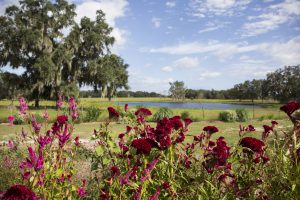
Today’s Climate
Photo Source: UF/IFAS Photo Database
Many confuse the two words climate and weather. Weather is the day to day conditions of our atmosphere. Whereas, climate refers to the average of the weather over time. Weather depicts how we dress day to day and can change often. Climate refers more to the average weather over time. We generally must prepare for our climate by buying appropriate clothing and preparing our home for longer term weather conditions.
What causes the climate to change? There are three important greenhouse gases that have dramatically increased since industrialization: carbon dioxide, nitrous oxide and methane. The increases are primarily due to our changes in land use over time. These factors make our earth’s surface temperature warmer which affects our loss of sea ice and longer fire seasons, and can contribute to extreme weather events.
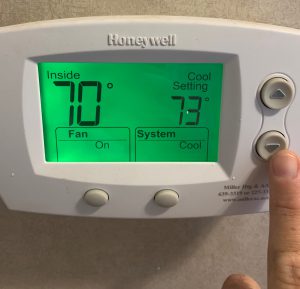
Adjust the temperature
Photo Source: Julie McMillian
The question is, what can I do in my own world and community to help on an individual basis? There are several ways that we can reduce our energy use of electricity at home which will help us to contribute to the bigger picture. Some simple suggestions are when you are not using the television, computer, lights, heating and cooling, try to turn them off or down for a while. Purchasing shades or curtains for your windows can keep your house cooler in the summer and fans may be able to replace the air conditioner on some occasions. When running the air, heat or hot water heater check your thermostat for energy saving features. Try to only run the dishwasher or washing machine with full loads and be sure to clean out your lint trap in the dryer so it has good airflow. You will find you might even save a few dollars by being mindful of your energy consumption.
Next, let’s talk about reducing greenhouse gases in our yards. Composting food scraps is a great way to reduce waste from landfills and turns your waste into reusable soil. Planting trees and plants helps to reduce carbon dioxide in the atmosphere. Plants store carbon and help to regulate temperatures in the home. Another thing to consider is, where does your water run off go? If water can be routed to your garden it is a win-win.
How do we plan our food system in our home? Reducing food waste has many benefits. We can save money, help our community, conserve energy and resources just by rethinking the way we plan our meals. If we buy more unprocessed foods, there will be less packaging. If we are able to grow our own food or just eat at home more, it cuts down on trips to restaurants and stores.
These are just a few ways to get you thinking about climate change in Florida. As a citizen, we can take action by staying informed and showing our support. If we hold ourselves accountable by looking at our personal impact, we may be surprised what we are leaving behind with our footprint. For more information on healthy living or other extension related topics, contact your local UF IFAS county extension office.
Supporting information for this article can be found in the UF/IFAS Extension EDIS publications:
Science Support for Climate Change Adaptation in South Florida
Climate Change Adaptation: New Perspectives for Natural Resources Management and Conservation
Energy Efficient Homes
UF/IFAS Extension is an Equal Opportunity Institution.















